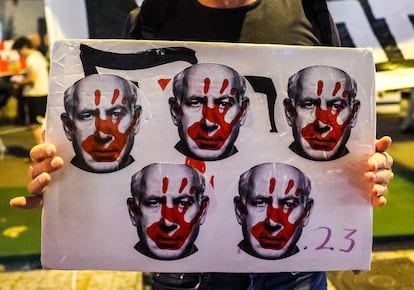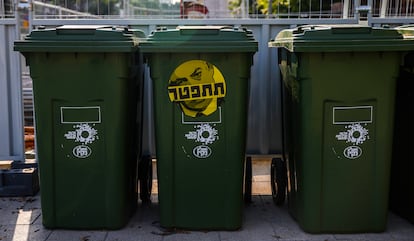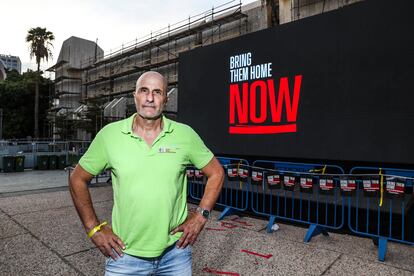Netanyahu’s increasingly tight corner
The Hamas attack has further dented the Israeli Prime Minister’s popularity and a growing number of Israeli citizens are calling for his resignation, though most prefer to postpone the debate until the war is over

On October 8, as the Israeli population was beginning to digest the fact they had just been struck the day before by the deadliest attack in the country’s 75-year history, Gideon Avital-Eppstein stood alone on Tel Aviv’s Kaplan Boulevard with three banners. The slogans were “Bibi [Prime Minister Benjamin Netanyahu] is responsible,” “Leave our lives and our dead alone,” and “It’s time.” This last was a response to “It’s not time,” the phrase that was being used whenever someone calls for Netanyahu’s head for the massive security fiasco that failed to prevent the October 7 Hamas slaughter, or for his policy toward Hamas for more than a decade as he shifts the blame onto the shoulders of one military leader after another.
Despite the growing and deep underlying public unease with Netanyahu, the majority of Israelis insist on postponing the debate on his share of responsibility until the war is over. This is no doubt due to the importance of having a stable leadership over the next few months. Fifty six percent of the population believes that Netanyahu should resign after the end of the Gaza offensive, including 28% of those who voted for parties in the governing coalition last November, according to a poll released by the Dialog Center five days after the attack. A poll published last week by the daily Maariv also shows that 80% of Israelis want Netanyahu to take responsibility, including no less than 69% of those who supported him in the last elections. If elections were held now, his party, Likud, would go from 32 to 19 seats, out of a total of 120.
Avital-Eppstein, 71, doesn’t want to wait. And he is no longer alone. The appeal of his initiative has been growing, attracting hundreds of people on the evening of Saturday, October 28, in front of the Defense Ministry in Tel Aviv, with chants and banners such as “Bibi, terrorist for Israel’s security,” “You are an existential threat to Israel” and “You nurtured Hamas to win elections.”

Those demanding his resignation now are in the minority, and many perceive such a demand to be premature, misplaced or disrespectful to the victims. But it is a growing reality: on signs seen in the streets, posters hanging from bridges between Jerusalem and Tel Aviv, and in the calls of “Bibi, go home!” shouted by an elderly woman, breaking the silence at a rally to support the families of the 230 Israeli hostages in Gaza. Above all, it is evident online where there are countless angry videos on TikTok and an online petition for Netanyahu to “take responsibility and resign.” The petition is hoping for one million signatures, more than 10% of the country’s population of almost 10 million. This Sunday, October 29, the number of signatures had already exceeded 150,000.
Historian, writer and veteran of the 1973 Yom Kippur War, Avital-Eppstein argues that, today, trust matters more than stability. “Especially when we don’t know whether we are at the end of the beginning or the beginning of the end,” he explains as he stands amidst the demonstrators. Netanyahu “did everything possible to destroy Israel as we knew it,” he adds. He believes that now more than ever a leader is needed who “looks out only for the good of the state,” as Golda Meir is thought to have done during the Yom Kippur War — she eventually resigned because of previous mistakes flagged up by an inquiry — and not “for their personal interests,” like Netanyahu, whose office protects him from the three court cases in which he has been indicted.
The protector of Israel
This view is shared by Yair Golan, the reserve commander general and former deputy economy minister for the pacifist left-wing Meretz party, who commands respect and admiration on the streets of Tel Aviv and who joined the efforts to get young people out alive from the Re’im rave that turned into a bloodbath. He calls for Netanyahu to resign immediately and rebuild Israel on the basis of its historical values. “I’m no historian,” he says, “but I’ve been in the army for 38 years and I can’t recall a country that fought well without trust in its leader.”
Avital-Eppstein points out that, at the height of World War II, Winston Churchill succeeded Neville Chamberlain as prime minister when Chamberlain was discredited for having advocated a wait-and-see approach in the face of the Nazi hostilities. The comparison is made frequently because Netanyahu, who has been in power longer than any other Israeli leader, has built his career on an image of being an effective manager of the country’s economy and a tough guy who refuses to negotiate when it comes to Israel’s security. “How would you like to be remembered?” a journalist asked him seven years ago. “As the protector of Israel. That’s good enough for me,” he replied.
However, a 2008 video sourced from the archives and circulating on networks and social media shows Netanyahu suggesting in his own words that right now, he might not be the right man for the job. After a damning report was published on the 2006 war with Hezbollah, he says of prime minister Ehud Olmert at the time: “He who destroys cannot restore. It’s like the captain of the Titanic asking to command another ship.”

Noam Gidron, an associate professor in the Political Science department at the Hebrew University of Jerusalem, points out that Israel’s crisis is being played out in a context of unprecedented “emotional polarization,” and that Netanyahu “can’t not be seen as responsible” when he has been in power almost continuously since 2009. “It’s true that he still has his camp of supporters, but we haven’t seen the phenomenon that usually occurs in the event of war and that one might expect,” he explains to EL PAÍS. Gidron is referring to the instinctive surge of support for the government in the event of crises or war, known in political science as the rally-around-the-flag.
The main national satirical TV program, Eretz Nehederet, mercilessly parodied Netanyahu last week with a skit in which he begins to address the nation as if he is about to take responsibility, but instead says he is taking the afternoon off with his wife Sara because it has been very hard to learn of the existence of Hamas — whose name he has to read — and the fact that it has been firing rockets at Israel for years.
Deleted tweet
If the program reveals the extent of Netanyahu’s loss of face, the predicament he got into on Sunday, October 29, reveals the extent of his political weakness. It involved a tweet — which he eventually deleted — in which he indirectly responded to a question about whether he had received military reports in the previous months warning of the growing possibility of war. The question was put to him on Saturday, October 28, by a journalist at the Prime Minister’s first press conference since the catastrophe. After the conference, Netanyahu tweeted that “at no time” had he received a warning about “Hamas’ war plans” and that “all security officials, including those in military intelligence and the Shin Bet [the secret services in Israel and Palestine], believed that Hamas had been deterred and was interested in a settlement.”
With tension at an all-time high, the tweet did not go unnoticed, especially because the man who had said “everyone will have to give answers, including me,” has since pointed the finger at two specific individuals: Aharon Haliva, head of the army’s military intelligence, and Ronen Bar, director of the Shin Bet. Benny Gantz and Gadi Eisenkot, two former chiefs of staff who have left the opposition to join the current emergency government, immediately asked him to retract his statement. Meanwhile, his finance minister, the ultra-nationalist Bezalel Smotrich, also gave him grief as did former prime minister Yair Lapid, who accused him of crossing “a red line.”

Shortly thereafter, Netanyahu issued an apology on X, formerly Twitter: “I was wrong. The things I said after the press conference should not have been said and I apologize for that. I give my full backing to all the heads of the security forces.” The controversy is part of the underhand battle over the burden of blame being waged by the political and military establishments. As Israel is still at war, the battle is currently being fought quietly and through leaks to the media.
While the Israeli army has public support and remains the institution most highly valued by the Jewish majority with 87% acceptance, support for the government has dropped to 20%, according to a poll released October 23 by the Israeli Institute for Democracy’s analysis department. This is eight points less than June, when it was already struggling due to the controversial judicial reform. The change of heart is particularly noticeable among right-wing Israelis whose support has dropped from 42% to 31%.
Gary Jackob, 54, falls into this category. The last time he went to the ballot box in 2021, he voted for Likud. On October 27, he said he felt cheated. “Of course, he’s not solely responsible, but I voted for him on the security ticket he was standing on. And in this mini-Holocaust he has shown that he was not strong, but weak. And that there was nothing behind his words, that he was bluffing,” he added, speaking from the esplanade of the Tel Aviv Museum of Art, where he was showing solidarity with the families of the hostages. Jackob, stayed at home while a large part of Tel Aviv was demonstrating against Netanyahu’s judicial reform, but he is now charging the government with having “mistaken its enemy. What have they been doing for the past year? The enemy is Hamas, not the Supreme Court,” he says of the now paralyzed reform, which has stripped the court of one of its main prerogatives.

Having set a Sabbath supper table with empty chairs in honor of the hostages, Sharon says she did attend the anti-reform protests, but believes it is not the time to talk about such issues. “We have to put our energies into other things,” she says. “This is a time to unite, not to demonstrate. And, to tell the truth, if I were one of the hostages’ relatives, I wouldn’t want to be hearing shouts of ‘Bibi out!’ around me.”
Beside her, Tzipi, 67, declares herself “full of doubts” on the subject. “At first, I thought, we have to be strong and give our full support to the government. And Bibi is an experienced leader. But as time goes on, I’m leaning more towards thinking that maybe we need another person to lead this war. But I also don’t want us to go from bad to worse.”
The debate is on the table. And in a nerve-wracked Israel, arguments are easily generated.
–”I have five friends kidnapped, he should take responsibility!” a young man shouted at a woman.
–”And I have a daughter at the front and I don’t want him to,” she replied.
–”The main thing now is for Bibi to leave.”
–”Is that what you call unity, that everyone thinks like you?”
Two men end up insulting each other next to Lilah Hershkovitz, in front of a sign with the phrase: “How easy it is to say it’s not the time.” Hershkovitz insists that Netanyahu must go. “He who led us to disaster cannot lead us to victory,” she argues, while sending a message to the rest of the politicians, “Everything can’t be about: ‘Either Bibi is in power, or Bibi is guilty.’”

Sign up for our weekly newsletter to get more English-language news coverage from EL PAÍS USA Edition
Tu suscripción se está usando en otro dispositivo
¿Quieres añadir otro usuario a tu suscripción?
Si continúas leyendo en este dispositivo, no se podrá leer en el otro.
FlechaTu suscripción se está usando en otro dispositivo y solo puedes acceder a EL PAÍS desde un dispositivo a la vez.
Si quieres compartir tu cuenta, cambia tu suscripción a la modalidad Premium, así podrás añadir otro usuario. Cada uno accederá con su propia cuenta de email, lo que os permitirá personalizar vuestra experiencia en EL PAÍS.
¿Tienes una suscripción de empresa? Accede aquí para contratar más cuentas.
En el caso de no saber quién está usando tu cuenta, te recomendamos cambiar tu contraseña aquí.
Si decides continuar compartiendo tu cuenta, este mensaje se mostrará en tu dispositivo y en el de la otra persona que está usando tu cuenta de forma indefinida, afectando a tu experiencia de lectura. Puedes consultar aquí los términos y condiciones de la suscripción digital.









































